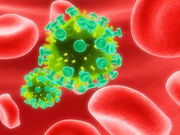Prostate and lung cancer expected to emerge as the most common types by 2030
MONDAY, May 7, 2018 (HealthDay News) — The cancer burden among persons living with HIV (PLWH) is projected to shift by 2030, according to a study published online May 8 in the Annals of Internal Medicine.
Meredith S. Shiels, Ph.D., from the National Cancer Institute in Bethesda, Md., and colleagues projected the number of anticipated cancer diagnoses among adult PLWH in the United States through 2030. New cancer diagnoses were classified as AIDS-defining cancer (ADC; e.g., Kaposi sarcoma, non-Hodgkin’s lymphoma, and cervical cancer) and non-AIDS-defining cancer (NADC).
The researchers found that the proportion of adult PLWH in the United States aged ≥65 years is projected to increase from 8.5 percent in 2010 to 21.4 percent in 2030. For Kaposi sarcoma, non-Hodgkin’s lymphoma, cervical cancer, lung cancer, Hodgkin’s lymphoma, and other cancer types combined, age-specific rates are projected to decrease through 2030 across age groups. Rates will decline among those aged ≥65 years for colon cancer. The estimated total cancer burden in PLWH will decrease from 8,150 cases in 2010 to 6,690 cases in 2030, with prostate and lung cancer projected to be the most common cancer types.
“Cancer will remain an important comorbid condition, and expanded access to HIV therapies and cancer prevention, screening, and treatment is needed,” the authors write.
Copyright © 2018 HealthDay. All rights reserved.








